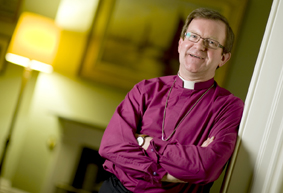Bishop calls for clarity on taxes affecting the poorest
BISHOP Christopher today (Dec 4) urged the government to be clear about how its tax policy hits poor families across the country.

Bishop Christopher
Speaking in the House of Lords, the bishop welcomed elements of the Chancellor’s Autumn Statement, including changes to stamp duty, ISAs, fuel duty and air passenger tax.
But Bishop Christopher, who studied economics and lectured in the subject before ordination, claimed the announcements would make little difference to poorer families seeking to save, to work and to own their own homes. He emphasised that many of those currently on benefits were also working.
He also urged the government to come clean on hidden taxes – such as National Insurance – which hit those working on low incomes the hardest.
He said: “The dignity of work with the capacity to provide for a family and save for the uncertainties of the future, and the ambition of home ownership, remain beyond many. I shall look – and I am sure I am not alone – for the benefits of the anticipated economic growth to reach those who may now be among the welcome record number in employment, but are still dependent, despite a full time job, on benefits.
“The Chancellor’s new target of a personal tax allowance of £12,500 is undated and would just take those working full-time on minimum wage out of tax. At some future unspecified date, there would indeed be no income tax for those on the minimum wage. But there would still be a National Insurance contribution on income above just less than £8,000, an income tax of 12 per cent by another name.
“Surely the time has come, for the sake of honesty and clarity, to name the reality and not perpetuate a fiction. I echo the conviction, used in a different reference last night, that we challenge this candour deficit.
“The Chancellor’s confidence that ‘we stay on course to prosperity’ is not yet the personal experience of many known to me and to the parishes and clergy in my diocese, especially in the urban and rural areas of coastal south-east Hampshire and the Isle of Wight.”
The bishop welcomed the announcements in the Autumn Statement about the refund of VAT on expenditure by hospices and the £15m towards the repair of roofs on listed places of worship.
“There is much to welcome in the less publicised parts of the Statement,” he said. “I know many in this House will delight in the refund of VAT on expenditure by hospices. This taxation of a hugely valued provision and care, predominantly funded by voluntary donations, has long been overlooked and been for many of us indefensible. I welcome too the extension of the £2,000 Employment Allowance to carers, who do so much for family members, friends and neighbours in sickness and disability.
“With less individual but very important significance to communities and business, I am grateful to the Chancellor of the Exchequer for granting £15 million towards the repair of roofs on listed places of worship. This is a recognition of the importance of our church buildings, many of which are at risk, to our national heritage. They are a tangible link with our past and very often a focus of local identity. Today they are increasingly used not only for worship, but for wider community activity, and are visited and enjoyed by a large and diverse number of people.
“This Autumn Statement sets a high level of aspiration and raises the hopes of many. I know you will understand when I conclude by saying that I pray, and not just hope, that with further spending cuts to come the aspiration for the nation will be enjoyed by the many and not just those who now benefit from the welcome but modest steps the Chancellor has made.”